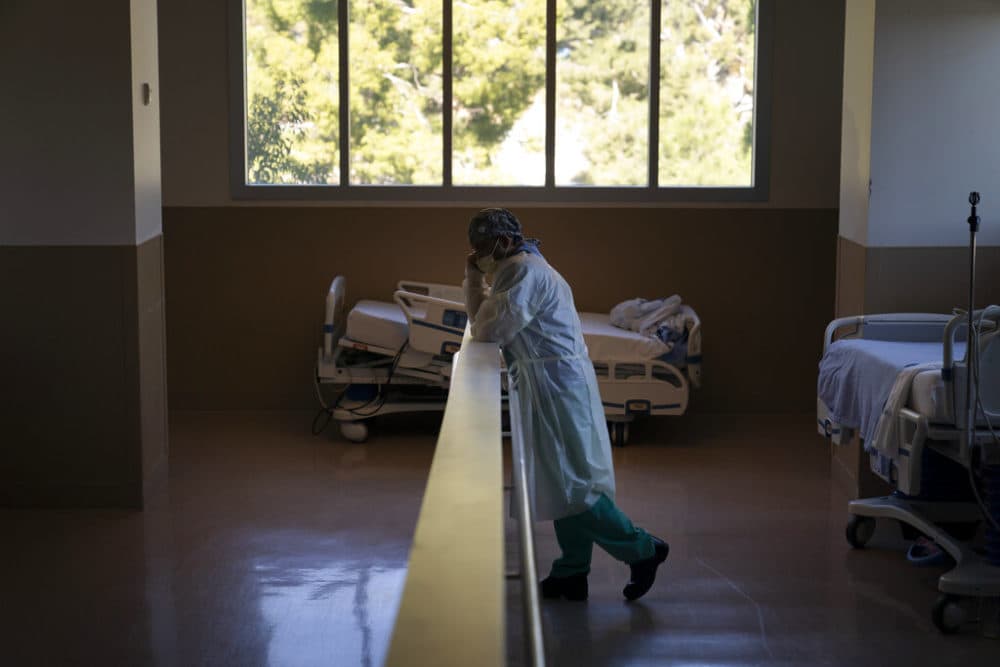Advertisement
Moral injury in modern medicine and how to heal health care workers

Sign up for the On Point newsletter here.
The United States has the largest for-profit health care system in the world.
More and more health care professionals say that they're being forced to make choices that are bad for patients.
"We not only feel that we can't provide what we know the patient needs. But we feel complicit in a money-first system that's asking us to act in ways that put profit above what's best for the patient."
And that leads doctors to suffer from moral injuries.
Today, On Point: Moral injury in modern medicine.
Guests
Dr. Wendy Dean, former emergency room doctor and psychiatrist. President and co-founder of the non-profit The Moral Injury of Healthcare. Author of the new book If I Betray These Words: Moral Injury in Medicine and Why It's So Hard for Clinicians to Put Patients First. (@WDeanMD)
Also Featured
Dr. Jessica, OB-GYN in Pennsylvania.
Dr. Jamie Wooldridge, pediatric pulmonologist.
Dr. Elena Perea, hospital psychiatrist in western North Carolina.
Interview Highlights
On first signs of moral injury in modern medicine
Dr. Wendy Dean: "I felt these from the time that I entered into medicine, but really over the past decade or so, it seems to have intensified. And I think the only reason that I could see that so clearly was because I was no longer practicing. So I had a bit of ability to step away and to take a broader view. And so I could watch my colleagues across the country who were struggling and said, like Jessica, I still love my patients, I love the medicine I practice, but it's everything else that's getting in the way that's really grinding me down."
What's causing moral injury in health care?
Dr. Wendy Dean: "Every time that we're asked to attend to something that is not our patients' best interest. So, for example, when we have to turn away, we have to turn our backs in order to fill in the electronic medical record. That feels like a small turning away from our patients, taking care of our organization instead of taking care of them. When we have to spend an hour getting a prior authorization for care that we know they deserve. That feels like we're turning towards the business of medicine and taking care of it rather than taking care of our patients. It's not any one big egregious thing. It's many, many smaller. Cuts, shall we say, death by a thousand cuts, not one massive injury."
On the challenges for health care professionals
Dr. Wendy Dean: "The costs of health care and becoming efficient are part of what drives this. But the other challenge for clinicians as a whole is that the corporatization of care has led to a shift in where decisions are made rather than being made by clinicians who work at the bedside, whether they're nurses or doctors, they're being shifted into management, upper management or into the C-suite. And it is not infrequent that the folks who are at those levels may not ever have been a clinician. And so, trying to make decisions for those on the front lines becomes harder. And it may be less closely connected to what will work for them."
Are any of these options viable or even on the horizon?
Dr. Wendy Dean: "There are places that are that are taking some of those actions. And, for example, the FTC has already started taking action on health care system consolidation. They're looking at it not just from the patient perspective and whether or not it will be cheaper for them to receive care in the system. But also looking at it from a workforce perspective, what will be the impact on the workers in the area?
"So, for example, in Albany, New York, many of the emergency rooms there are contracted with one single medical group, one for profit emergency physician group, an emergency physician who is unhappy there, can't move without literally moving themselves and their family because there is a monopoly on emergency care there.
"So breaking that monopoly, breaking the noncompete clauses that keep physicians from moving across town, they have to move across the county or across the state. There are a lot of options that we can take, but we have to be willing to make those changes."
Book Excerpt
Excerpt from If I Betray These Words by Dr. Wendy Dean. All rights reserved. Not to be republished without permission of the publisher, Steerforth Press.
This program aired on April 4, 2023.

